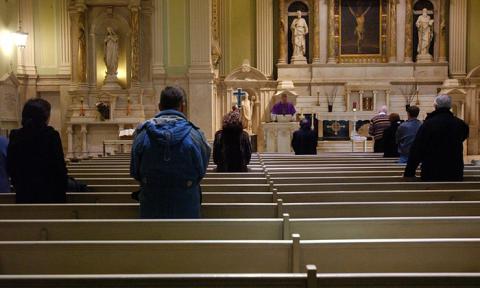Declining levels of religious belief and practice among the generation of Americans born in the last two decades of the 20th century is shifting the US towards becoming a less devout nation, a major new survey has found.
The growing proportion of “millennials” – young adults now in their 20s and 30s – who do not belong to any organised faith is changing America’s religious landscape, says a report by the respected Pew Research Center, based on a survey of 35,000 people.
The religiously unaffiliated or “nones”, who include atheists and those who describe their religion as “nothing in particular”, have grown to 23% of the US population, compared to 16% at the time of the last comparable survey in 2007.
But three out of four Americans still have some religious faith, mainly Protestant denominations, Catholics, Jews, Mormons, Muslims, Buddhists and Hindus. And 89% of US adults say they believe in God – including a significant proportion of “nones” – making America more religiously inclined than other advanced industrial nations.
Youth largely equates with a lack of religious activity, says the report. One in four millennials attend religious services on a weekly basis, compared with more than half of those adults born before or during the second world war. Only 38% of adults born after 1990 say religion is very important in their lives, compared with 67% of those born before 1945.
Overall, 55% of American adults say they pray daily, 53% say religion is very important in their lives and 50% attend a religious service at least once a month. Significantly, more women (64%) pray on a daily basis than men (46%).
The 2014 Religious Landscape Study follows an analysis in May which looked more broadly at the changing religious composition of the US public. The report released on Tuesday examines beliefs and practices.
In general, it says, “as older cohorts of adults (comprised mainly of self-identified Christians) pass away, they are being replaced by a new cohort of young adults who display far lower levels of attachment to organised religion than their parents’ and grandparents’ generations did when they were the same age”. However, the report also points out that “there is a tendency for people to become more religious as they get older”.
The changes are reflected in support for the two main political parties, with “nones” now forming the largest single religious group among Democrats, while evangelical Protestants make up the largest religious bloc among Republicans.
Nearly all major religious groups have become significantly more accepting of homosexuality, the report says. A majority of all Christians now say homosexuality should be accepted by society, up from 44% in 2007 to 54% in 2014, with the proportion of Catholics up from 58% in 2007 to 70% in 2014.
There has been little change in attitudes to abortion, with 53% of all adults saying it should be legal in all or most cases.
Almost half of those questioned said they felt a “deep sense of wonder about the universe” on a weekly basis, an increase of seven percentage points since 2007, with little difference between the religiously affiliated and the “nones”.
11% of all US Christians say they speak or pray in tongues at least once a week. Only 40% of Jews never eat pork, compared with 90% of Muslims who never eat it.
Harriet Sherwood is the Guardian's religion correspondent. She was previously Jerusalem correspondent, foreign editor and home editor


Spread the word